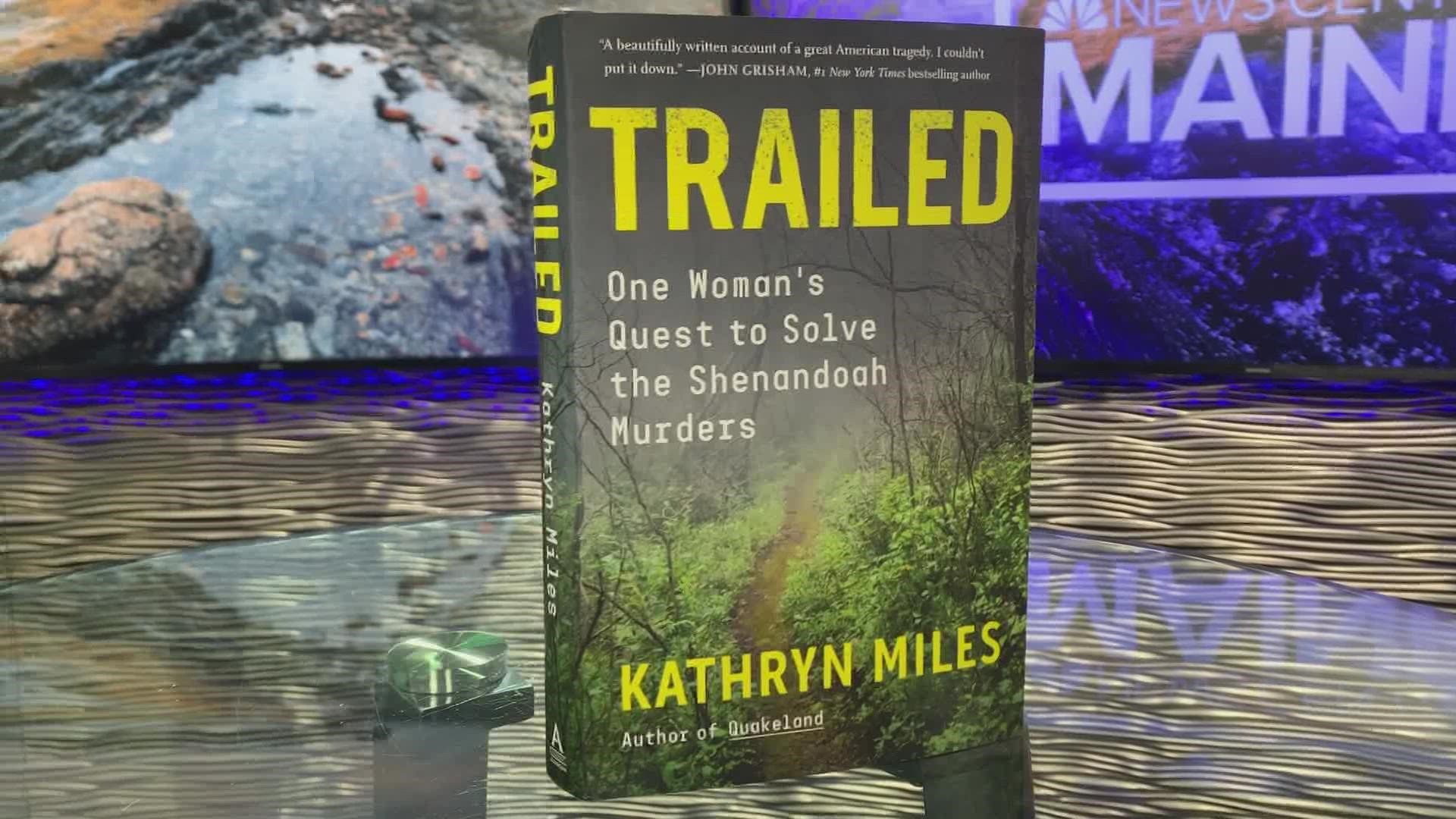PORTLAND, Maine — It was in May 1996 when investigators found the lifeless bodies of Unity College student Lollie Winans and her partner, Julie Williams, at their campsite at Shenandoah National Park in Virginia. The couple had been bound and gagged. Their throats had been cut.
It was a crime that stopped many backpackers and hikers in their tracks and a scene wrier and journalist Kathryn Miles would visit more than 20 years later while researching her book, "Trailed, One Woman’s Quest to Solve the Shenandoah Murders."
It hits shelves Tuesday, May 3.
The FBI will tell you they know who the killer is, but the case has gone cold.
Miles first became aware of the murders around the time they happened. She too was an avid backpacker and would use the woods as a retreat and place of healing after being sexually assaulted years earlier. The women weren’t much older than she was, either.
When Miles took a job at Unity College roughly five years later, she was brought even closer to the women and their story. But it would be another decade or longer before Miles would dive into the full force into the details of what happened.
“It’s an undeniably brutal murder, and I really saw firsthand how it impacted investigators, family members, and then also this much wider, especially the LGBTQ+ community,” Miles said.
She spent months poring over court documents, meeting with Julie's and Lollie’s family and friends, scheduling appointments with the FBI, even performing experiments of her own just to get a clearer picture of what happened.
One of the big questions surrounding the crime was about time of death and how long the women had been dead before investigators arrived.
“This turns out to be very pivotal in terms of the two lead suspects. It rules one out, and it kind of rules one in,” Miles said. “I felt like it was a really crucial component, and I had been talking to a forensic anthropologist, who I think very factiously suggested to me if I really wanted to mark the time of death then I should get a bone in roast and sort of see how it decomposes, frankly. And so much to the chagrin of my neighbors, I did that and put it in my backyard, and it was all too vivid. “The take home message is do not get involved with true crime if you do not like maggots. That was one very vivid take-home message for me.”
For much of its investigation, the FBI has focused on Darrell Rice as a suspect. He was charged with the murders of both women, but the charges were eventually dropped. No one else has been charged, and the murders remain unsolved -- a detail Miles focuses on in the book.
“Aside from telling this love story of these two amazing women, one of the really big take-home messages for me is two-fold. First, the difficulty that we have with forensic science and solving crimes, especially wilderness crimes, but then also access to the wilderness and who we are in the wilderness,” Miles said. “The National Park Service has something like a $3 billion backlog of what they call deferred maintenance, and that includes hiring rangers and making sure that rangers have the weapons and the training and the radios that they need to keep the rest of us safe.”
“And then there's a whole set of Americans who just don’t feel safe in the wilderness," Miles went on to say.
Miles said she has had a number of people reach out or come up to her about the book and the impact the crime had on them. In many cases, the person said they stopped going into the woods or backpacking or hiking alone altogether.
“That’s a really sobering impact of all of this, and we haven’t really talked about that as a country.” Miles said.
While it was important for Miles to understand the many details of the case for her book, there was another key detail: the relationship between Lollie and Julie. The two started a romantic relationship together, and there were questions around whether their deaths were the result of a hate crime.
“They were just extraordinary, and I knew that I really wanted to have sort of a victim story,” Miles said. “I think for obvious reasons we get really interested in the minds of killers and especially serial killers. But along the way I think the victims sort of become objects. And for me personally Lollie and Julie had always just been these fully flushed out, very vibrant humans, and I wanted to make sure that that continued in the book, so I worked really closely both with Julie’s family and friends and then also Lollie’s community to make sure that I could tell the story of their lives as well as their deaths."
At the end of the book, Miles writes about the negative toll the research and writing had taken on her, from drinking too much alcohol to putting strain on relationships. It begs the question: Was it all worth it?
“I think we’ll see. I mean, certainly telling Lollie and Julie’s story makes it worth it,” Miles said. “I think what really makes it worth it for me is to see some of these larger questions asked and to maybe see enough public pressure on the FBI that they kind of get out of the box that they’ve put themselves in and start trying to solve some of these cases.”

